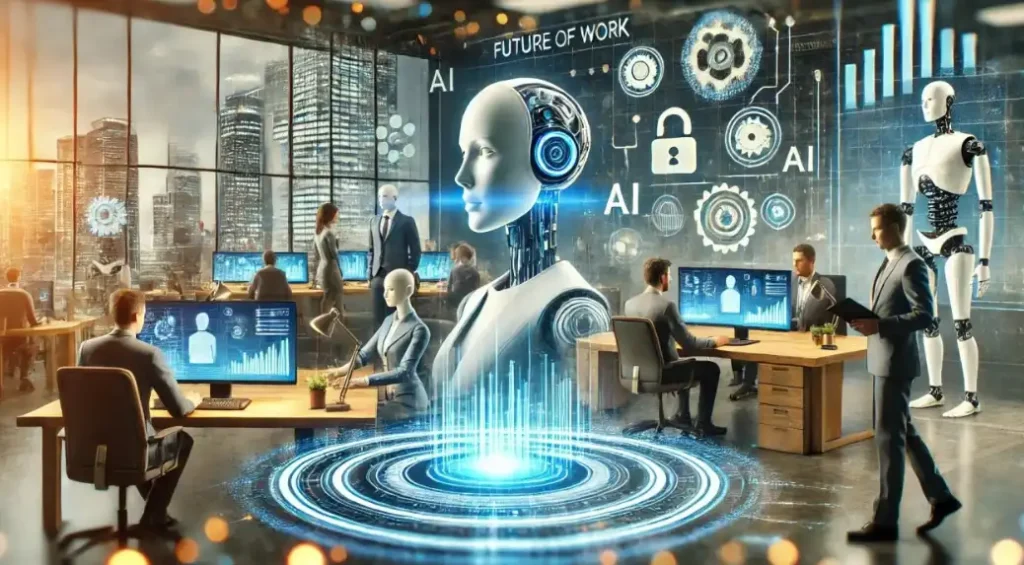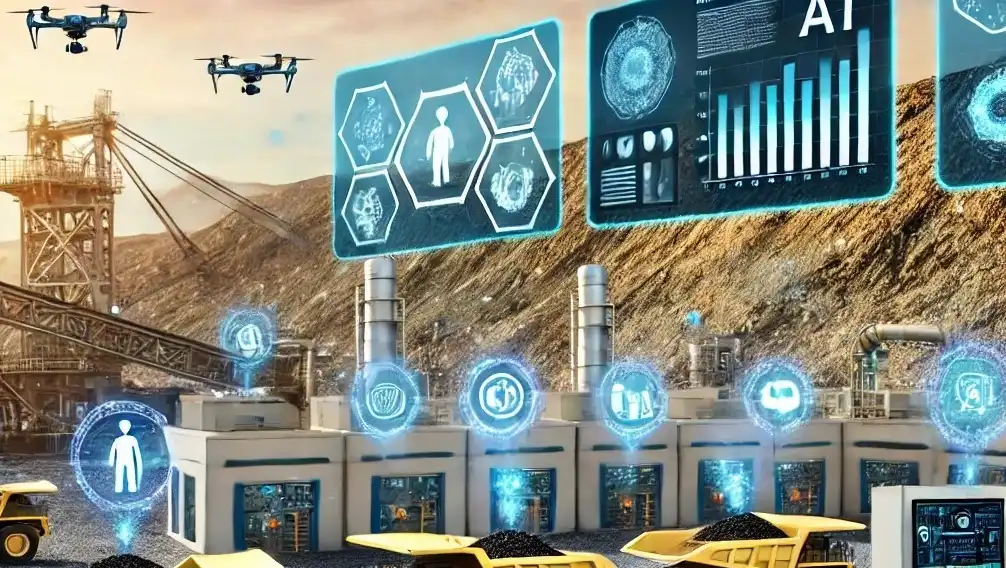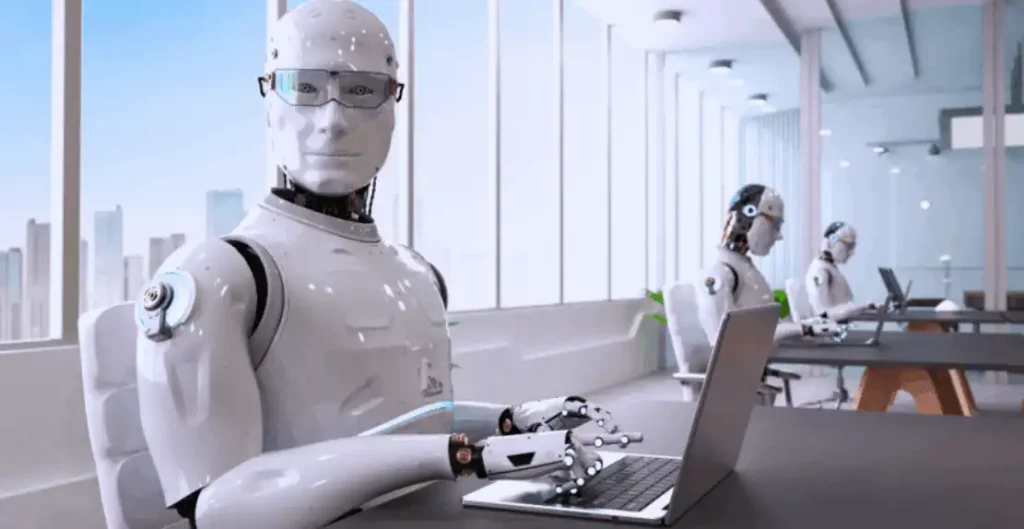How Is AI Shaping the Future of Work? Imagine a world where repetitive tasks are automated, allowing employees to focus on more creative and strategic endeavors. This isn’t just a futuristic dream—it’s happening now. AI is streamlining operations in industries from finance to healthcare, optimizing processes and boosting efficiency.
One of the most exciting aspects of AI in the workplace is its ability to analyze vast amounts of data in record time. It’s like having a supercharged assistant who can sift through mountains of information and extract meaningful insights in seconds. This capability is invaluable in decision-making processes, where speed and accuracy can make all the difference.
But AI isn’t just about crunching numbers. It’s also making waves in customer service, where chatbots powered by AI can engage with customers 24/7, providing instant responses and personalized support. This not only improves customer satisfaction but also frees up human agents to tackle more complex issues.
In fields like medicine and research, AI is accelerating discoveries and treatments. Machine learning algorithms can now analyze medical images and patterns, assisting doctors in diagnosing diseases earlier and more accurately than ever before. This means better outcomes for patients and more efficient use of healthcare resources.
Moreover, AI is paving the way for new job opportunities that we couldn’t have imagined a decade ago. Roles like AI trainers, data scientists, and robotics engineers are in high demand as companies invest in AI technologies. This shift is not just about replacing jobs—it’s about creating new ones that require uniquely human skills like creativity, empathy, and critical thinking.
As AI continues to evolve, so too will its impact on the future of work. The key lies in embracing these advancements while ensuring that they benefit society as a whole. By harnessing the power of AI responsibly and ethically, we can shape a future where humans and machines work together harmoniously, driving innovation and prosperity for all.

AI Revolutionizes Job Markets: A Look into the Future of Work
One of the most exciting aspects of AI in job markets is its ability to streamline processes that were once time-consuming. Tasks like data entry, customer support, and even basic legal documentation can now be handled by AI algorithms, freeing up human workers to focus on more creative and strategic endeavors. This shift isn’t about replacing jobs; it’s about enhancing productivity and allowing humans to excel in areas where empathy, intuition, and complex problem-solving are crucial.
Take healthcare, for example. AI-powered diagnostic tools can analyze medical images with a precision that rivals experienced radiologists, detecting patterns and anomalies that might be overlooked by the human eye. This doesn’t mean doctors are obsolete; rather, it means they can collaborate more effectively with AI to deliver faster and more accurate diagnoses, ultimately saving lives.
In the realm of education, AI is personalizing learning experiences like never before. Adaptive learning platforms can assess students’ strengths and weaknesses in real time, offering customized lesson plans and resources that cater to individual needs. This not only improves educational outcomes but also prepares students for a workforce where lifelong learning and adaptability are key.
But what about industries like transportation and logistics? AI is optimizing supply chains, predicting demand fluctuations, and even piloting autonomous vehicles. The result? More efficient delivery systems, reduced carbon footprints, and safer roads.
As we look ahead, it’s clear that AI isn’t just a trend—it’s a seismic shift in how we approach work. Companies that embrace AI will thrive in a landscape where agility and innovation reign supreme. So, whether you’re a seasoned professional or just starting your career, staying abreast of AI developments will be crucial in navigating the future of work. After all, the future is already here—powered by AI.

From Automation to Augmentation: AI’s Role in Reshaping Careers
Artificial Intelligence (AI) is not just a buzzword anymore; it’s transforming the landscape of careers worldwide. Traditionally, many have feared AI as a force of automation, replacing human jobs with machines. However, the reality is more nuanced and promising: AI is increasingly playing a pivotal role in augmenting human capabilities rather than simply automating tasks.
Imagine AI as a trusted assistant, empowering professionals to achieve more than ever before. In fields such as healthcare, finance, and even creative industries, AI tools are enhancing productivity and accuracy. For instance, in medical diagnostics, AI algorithms can analyze vast amounts of patient data to assist doctors in making faster and more accurate diagnoses.
But how does AI move from automation to augmentation? The key lies in its ability to learn and adapt. Machine learning algorithms, a subset of AI, can improve themselves over time by analyzing patterns in data. This capability allows AI systems to offer personalized recommendations, predict future trends, and automate routine tasks, freeing up human workers to focus on more complex and strategic endeavors.
Think of AI as a collaborator rather than a competitor. Just as a carpenter relies on precision tools to craft intricate designs, professionals in every field can leverage AI to enhance their skills and decision-making processes. This collaboration leads to greater efficiency and innovation across industries.
Moreover, AI is not limited to technical fields alone. In creative sectors like marketing and design, AI-powered analytics can sift through consumer behavior data to uncover insights that human marketers might overlook. This synergy between human creativity and AI-driven insights often leads to groundbreaking campaigns and products that resonate deeply with audiences.
As AI continues to evolve, so too will its impact on careers. The future promises roles that blend technical proficiency with creative problem-solving—skills that AI complements rather than replaces. By embracing AI as a tool for augmentation, professionals can navigate the shifting job market with confidence, knowing that their expertise combined with AI’s capabilities will define the future of work.

Unveiling the AI-Powered Workplace: What’s Next for Employees?
AI has already revolutionized industries, and its impact on the workplace is nothing short of transformative. From automating mundane tasks to personalizing user experiences, AI is set to redefine how employees work and collaborate. But what exactly does this mean for you, the employee?
Firstly, say goodbye to the drudgery of repetitive tasks. AI excels at handling routine operations, freeing up valuable time for more meaningful work. Imagine AI algorithms sorting through mountains of data, leaving you with insights to drive strategic decisions. It’s like having a tireless assistant who handles the paperwork while you focus on innovation.
Secondly, communication within teams and across departments will leap to new levels. AI-powered chatbots can facilitate instant communication, ensuring that queries get resolved swiftly and information flows seamlessly. No more waiting for emails or chasing down elusive colleagues; AI ensures everyone stays on the same page effortlessly.
Moreover, the AI-driven workplace will foster a culture of continuous learning. Machine learning algorithms can analyze your work patterns and suggest personalized learning modules to enhance your skills. It’s professional development tailored just for you, helping you stay ahead in a rapidly evolving job market.
But perhaps the most exciting aspect of the AI-powered workplace is its ability to enhance creativity. By handling the mundane, AI allows humans to focus on what they do best: generating ideas and solving complex problems. It’s a synergy where human ingenuity combines with machine efficiency to create unprecedented solutions.
As we step into this AI-driven future, the workplace will evolve into a dynamic ecosystem where efficiency meets creativity head-on. Embrace the change, because the AI-powered workplace isn’t just a glimpse into the future—it’s the future unfolding before our eyes.

Skills of Tomorrow: Adapting to AI’s Influence on Work Dynamics
One of the most crucial skills for navigating AI’s influence on work dynamics is adaptability. Just as AI constantly learns and evolves, so too must we. Being adaptable means being open to change, quick to learn new technologies, and flexible in our approach to problem-solving. Think of it as staying nimble in a world where the only constant is change.
Another vital skill is creativity. While AI excels at automating routine tasks, it’s human creativity that drives innovation and pushes boundaries. Creativity involves thinking outside the box, coming up with novel solutions, and envisioning possibilities that AI alone cannot conceive. It’s about using our imagination to harness AI as a tool for achieving new heights.
Critical thinking remains as essential as ever in an AI-dominated landscape. As AI processes vast amounts of data and makes decisions, humans must possess the ability to analyze, interpret, and evaluate these outcomes. Critical thinkers can identify biases, errors, and ethical considerations that AI might overlook, ensuring responsible and effective implementation.
Collaboration skills also become increasingly valuable in a world where humans and AI work hand in hand. Effective collaboration involves not only understanding AI’s capabilities but also leveraging them alongside human strengths. It requires communication, empathy, and the ability to work across diverse teams to achieve common goals.
Lastly, emotional intelligence emerges as a key differentiator in AI-influenced work dynamics. Machines may excel at tasks requiring pure logic, but they lack the emotional understanding and empathy that humans bring to the table. Emotional intelligence allows us to navigate interpersonal relationships, understand motivations, and lead teams effectively in an AI-enhanced environment.
As AI continues to transform work dynamics, the skills that will set individuals apart are adaptability, creativity, critical thinking, collaboration, and emotional intelligence. By honing these skills, we not only embrace the potential of AI but also ensure that humanity remains at the forefront of innovation and progress.


